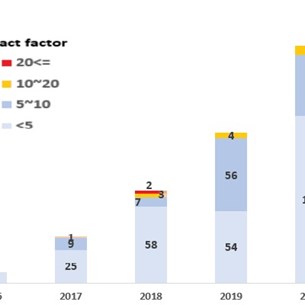Meeting
2017 Gastrointestinal Cancers Symposium

Seoul National University Bundang Hospital, Seongnam, Republic of Korea
Yoon Jin Choi III, Dong Ho Lee
Background: Obesity is a well-known risk factor for the development of esophageal cancer (EC). However, the impact of underweight on esophageal squamous cell carcinoma (ESCC) has not been fully recognized to date. Therefore, we herein sought to determine the risk of EC in subjects with underweight. Methods: We analyzed the clinical data from a total of 264,084 individuals with the age of 40 years or older, who received healthcare checkups arranged by the national insurance program, between 2003 and 2008. Newly diagnosed EC was identified using the claims data during a median follow-up duration of 7.9 years. Results: The mean body mass index (BMI) of patients was 23.80 ± 3.05kg/m2, and 6,784 individuals (2.6%) were classified as being underweight (BMI < 18.5 kg/m2). During the study period, 278 individuals (0.1%) developed EC. It was determined that underweight and obesity—compared with normal weight—were significantly associated with 73% increased risk and 30% decreased risk of EC, respectively. Excess risk of EC in the underweight group was independent of age, gender, smoking, and alcohol consumption. Heavy alcohol use had a synergistically increasing effect for developing EC among those in the underweight group. Conclusions: The mean body mass index (BMI) of patients was 23.80 ± 3.05kg/m2, and 6,784 individuals (2.6%) were classified as being underweight (BMI < 18.5 kg/m2). During the study period, 278 individuals (0.1%) developed EC. It was determined that underweight and obesity—compared with normal weight—were significantly associated with 73% increased risk and 30% decreased risk of EC, respectively. Excess risk of EC in the underweight group was independent of age, gender, smoking, and alcohol consumption. Heavy alcohol use had a synergistically increasing effect for developing EC among those in the underweight group.
Disclaimer
This material on this page is ©2024 American Society of Clinical Oncology, all rights reserved. Licensing available upon request. For more information, please contact licensing@asco.org
2017 Gastrointestinal Cancers Symposium
Poster Session
Poster Session A: Cancers of the Esophagus and Stomach
Cancers of the Esophagus and Stomach
Prevention, Diagnosis, and Screening
J Clin Oncol 35, 2017 (suppl 4S; abstract 14)
10.1200/JCO.2017.35.4_suppl.14
14
D14
Abstract Disclosures
2024 ASCO Genitourinary Cancers Symposium
First Author: David Lynn
2022 ASCO Annual Meeting
First Author: Hyeun Ah Kang
2024 ASCO Annual Meeting
First Author: Zac Coyne
2018 ASCO Annual Meeting
First Author: Randy C. Miles